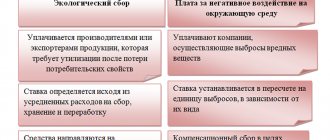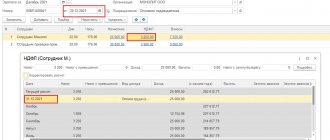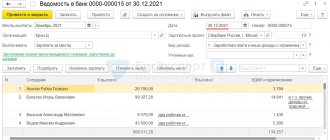When to transfer personal income tax from salary
According to the current fiscal legislation, the last date for settlements with the budget for income tax falls on the day following the day of payments to employees.
In simple words, if payment of remuneration for labor was made, for example, on July 17, then the tax must be transferred before July 18. Let us note that representatives of the Federal Tax Service strongly recommend transferring personal income tax from wages (the terms are set out in clause 6 of Article 226 of the Tax Code of the Russian Federation) on the same day as transferring wages to the current accounts of employees. Representatives of the Russian Ministry of Finance adhere to the same position.
However, in the activities of Russian companies there are many situations in which the issue of calculating and paying income tax is especially acute. Let's consider all problematic situations that are associated with the calculation and payment of income tax from individuals to budgets.
GLAVBUKH-INFO
The timing of payment of personal income tax calculated and withheld from employees’ wages depends, among other things, on whether wages are paid in cash from the cash register or transferred to employees’ bank accounts (salary cards). Everyone understands that it is important not to be late in transferring taxes to the budget. But there is no need to rush into this either. After all, not so long ago, the tax service clarified that the amount transferred to the budget as personal income tax in advance (before deducting it from the income of individuals) is in fact not a tax. Thus:- transfer personal income tax later than the deadline established by the Tax Code, you may incur penalties and a 20% fine;
- transfer personal income tax ahead of schedule, inspectors may consider personal income tax unpaid, and the transferred money as mistakenly paid. Moreover, it may not be possible to offset them against the payment of your personal income tax debts. And then you will have to transfer personal income tax again to the budget, pay penalties and fines.ÂÂÂ
Well, or sue, proving that you did not transfer your own funds to the budget, but the personal income tax of your employees, although you did it ahead of schedule.
When paying an advance, we do not transfer personal income tax
The day of receipt of salary is considered to be the last day of the month for which it was accrued. Therefore, regardless of the procedure for paying wages, personal income tax should be withheld and transferred to the budget once during the final calculation of the employee’s income for the entire month. Before the end of the month, income in the form of wages cannot be considered received and cannot be calculated. Therefore, when paying employees wages for the first half of the month, there is no need to withhold and transfer tax to the budget.
However, this approach is inconvenient if for the first half of the month the salary is calculated based on the time worked (as required by the Labor Code). After all, if one of the employees does not work a day in the second half of the month (for example, he gets sick or takes a vacation at his own expense) and the salary for the second half of the month is not accrued to him, then there will be nothing to withhold personal income tax calculated from the salary for first half of the month.
Therefore, there are several approaches used by accountants.
APPROACH 1. Accrue the salary for the first half of the month, reduced by the amount of personal income tax. Postings for withholding personal income tax when accruing and paying such an advance are not made. All personal income tax is withheld from the salary for the second half of the month (at the final settlement). For example, an employee’s salary is 30,000 rubles. (minus personal income tax, the employee receives 26,100 rubles). He receives 13,050 rubles as an advance payment. (RUB 26,100 / 2) by posting to the debit of account 20 “Main production” and the credit of account 70 “Payroll payments”. The same amount is paid to the employee. And upon final payment for the month, 16,950 rubles are credited. (30,000 rubles - 13,050 rubles), of which personal income tax is withheld in the amount of 3,900 rubles. (RUB 30,000 x 13%). On the last day of the month, a posting is made to the debit of account 70 and the credit of the subaccount “Calculations for personal income tax” of account 68 “Calculations with the budget for taxes and fees”. The employee receives 13,050 rubles. (RUB 16,950 - RUB 3,900). In this slightly crooked way, a result is achieved in which the employee receives approximately the same amounts both in advance and on the day of final payment for the month. And at the same time, personal income tax is withheld from wages for the second half of the month and transferred to the budget at the required time. Neither employees nor tax inspectors should have any complaints. And the accountant always has an amount from which personal income tax can be withheld. After all, even if an employee is ill throughout the second half of the month, at the end of the month he will have accruals equal to the amount of personal income tax from his salary for the first half of the month.
APPROACH 2. For the first half of the month, pay the salary in full, without its virtual reduction by the amount of personal income tax. Then withhold the tax, but you don’t need to transfer it to the budget right away: after all, we remember that according to the Tax Code rules, you need to wait for the final payment for the month and then transfer this tax along with personal income tax from your salary for the second half of the month. In our example:
- the employee will be credited 15,000 rubles for the first half of the month, and 1,950 rubles will be withheld. (RUB 15,000 x 13%) - this amount will be credited to account 68-“Personal Income Tax Payments” until the end of the month;
- the employee receives 13,050 rubles;
- for the second half of the month, the employee will also be credited 15,000 rubles, personal income tax will also be withheld 1,950 rubles;
- When transferring wages for the second half of the month to the employee’s bank card, personal income tax in the amount of 3,900 rubles is paid to the budget.
APPROACH 3. In the old fashioned way (without taking into account the modern requirements of the Labor Code), consider monthly payments to an employee not as “salary for the first half of the month + salary for the second half of the month,” but as “advance payment + final payment.” Just keep in mind that the amount of the advance should depend on the time actually worked in the first half of the month and the “net” salary (excluding personal income tax). With this approach, when paying an advance, there is no posting at all for its accrual - there is only a posting for payment on the debit of account 70 and the credit of account 50 “Cash” or 51 “Cash accounts”. In our example, the employee was given an advance in the amount of 13,050 rubles.
The employee's debt is listed in accounting until the end of the month.
At the end of the month, the salary for the entire month is accrued immediately in the amount of 30,000 rubles. and personal income tax is withheld from it in a single amount - 3900 rubles. It is transferred to the budget within the time limits established by the Tax Code.
Please note that all three approaches that we have considered have different “fillings” - how the accrual of an advance is reflected in accounting and when personal income tax is withheld from it. However, the employee receives the same amounts in his hands and the personal income tax is also paid to the budget in equal amounts and at the same time - within the period established by the Tax Code.
The second approach is more focused on the rules of the Labor Code. After all, according to the Labor Code, we must pay the employee wages twice a month. And only for tax purposes, the employee receives income once a month. Thus, with the second approach, withholding personal income tax from wages for the first half of the month is contrary to the recommendations of the Ministry of Finance, but it is unlikely that anyone will file a claim against the organization.
Salary to a bank card - personal income tax to the budget
When salaries are transferred to employees’ bank cards, it would seem that everything should be simple and clear. Personal income tax must be transferred to the budget on the day the salary is paid. Therefore, the payment slip for personal income tax must be submitted to the bank at the same time as the payment slip for the transfer of wages for the second half of the month. However, the specifics of the salary project may make adjustments to this rule. It often happens that in order to transfer money to employees’ salary cards, the following is required:
- draw up one payment slip for the total amount of payments to employees - on its basis, the money is debited from the organization’s current account;
- provide the bank with a register for crediting funds - according to such a register, money is credited to the personal accounts of employees (to their bank cards).
And if on the same day, due to the technical features of the banking program, it is not possible to combine these two actions, then the question arises: what is considered the date of salary payment and, accordingly, when to submit a personal income tax payment to the bank? Having considered this situation, the Ministry of Finance logically reasoned that at the time the general payment slip is submitted to the bank, no income arises for the employees, because they did not receive the money and could not receive it. Therefore, personal income tax must be transferred to the budget on the day the money is credited to the employees’ card accounts. But the organization is unable to control the process of such enrollment. After all, the agreement with the bank may indicate that money is not credited to employees’ bank cards exactly the same day, but, for example, within 3 days. However, inspectors will have to work hard to check the date of crediting money to employees' accounts. Therefore, it is logical to assume that if the money was not returned to the organization’s bank account, then the employee received it on the same day that the organization submitted the “salary” register to the bank. And it is with the register that you should submit a payment slip for personal income tax.
Note. The Letters from the Ministry of Finance and the Federal Tax Service mentioned in the article can be found in the “Financial and Personnel Consulting” section of the ConsultantPlus system
Withdrew money from a bank account to pay salaries - transfer personal income tax
Now let's see when you need to pay personal income tax if the salary is issued from the cash register, for which money is withdrawn from the bank account. For such a case, there is a special rule for withholding and transferring tax. It must be paid to the budget no later than the day the cash is received from the bank for the payment of wages, that is, the payment slip for the payment of personal income tax must be submitted to the bank on the same day when the cash is withdrawn by check. Moreover, it does not matter whether workers receive their salaries on the same day or not. What to do if the employee does not show up for his salary on the days it is paid? In this case, is it not necessary to write any applications to the inspectorate for a personal income tax refund, and subsequently pay it again (on the day the employee receives the money) or make any other adjustments? A specialist from the Ministry of Finance answered this question.
FROM AUTHENTIC SOURCES
STELMAKH NIKOLAY NIKOLAEVICH - Advisor to the State Civil Service of the Russian Federation, 1st class
“When an organization withdraws money from a bank account to pay salaries, it needs to transfer personal income tax withheld from employee income. If one of the employees cannot receive a salary from the cash register within the time period established by the organization - for example, due to illness, it is deposited (that is, it is considered received with a deferment). At the same time, there is no need to return personal income tax from the budget - the Tax Code does not contain such a procedure. Upon returning to work after illness, the employee will receive the amount of his salary minus personal income tax from the cash register.”
As you can see, the fact that the employee received his salary later does not in any way affect the organization’s calculations with the budget. By the way, the courts also believe that depositing wages does not relieve the tax agent from the obligation to transfer the withheld personal income tax to the budget. And if the organization transfers the tax later than necessary (for example, not on the day of withdrawing cash from the current account, but on the day the employee receives the deposited salary), then it faces penalties and a fine in the amount of 20% of the personal income tax amount.
However, there are exceptions to any rule. Let's see if there are exceptions to this rule.
FROM AUTHENTIC SOURCES
STELMAKH NIKOLAY NIKOLAEVICH, Advisor to the State Civil Service of the Russian Federation, 1st class
“If the situation is tragic, the employee has died, then the money accrued to him should be given to the relatives of the deceased. When payments (including wages) are accrued to a deceased employee, the amounts received by inheritance (with the exception of royalties) are not subject to personal income tax. Consequently, the organization should not calculate personal income tax on income accrued to a deceased employee. If the employee’s salary was accrued for the time worked (and he subsequently died) and personal income tax was withheld and transferred to the budget when receiving cash from the bank to pay such a salary, then there is no need to recalculate the tax when depositing it. After all, personal income tax was withheld and transferred to the budget in the manner established by the Tax Code. The organization did not make any mistakes. In this case, there are no grounds for a tax refund from the budget, because the tax can only be returned upon the application of the taxpayer (and since the employee has died, there cannot be an application from him).”
Salary from proceeds - personal income tax to the budget the next day
When an organization has cash revenue, it can be used to pay salaries, without necessarily withdrawing money from a bank account. Then the organization must pay the personal income tax withheld from wages for the second half of the month to the budget no later than the day following the day cash is issued to employees.
Workers can receive wages on different days. For example, a local regulation stipulates that salaries are paid until the 7th of the next month, and each department has its own day: one department receives salaries on the 5th, another on the 6th, and a third on the 7th. Or it may turn out that one of the employees does not come to collect their salary on the appointed day. How to transfer personal income tax to the budget in such situations? Obviously, one payment plan for all employees is not enough. In order to comply with the requirements of the Tax Code, the tax will have to be transferred to the budget in different payments over several days.
And one more feature: in the situation considered, the organization can transfer personal income tax to the budget directly on the same day on which it paid the salary from the proceeds. There is no need to wait until the next day. Inspectors will not consider that it is not a tax that is transferred to the budget, but something else (which we talked about at the beginning of the article). After all, on the day the tax is withheld and transferred to the budget, the employee’s income has already been paid.
* * *
As you can see, the easiest way is to transfer salaries to employees’ bank salary cards. And not only from the point of view of personal income tax accounting, but also from an organizational one.
——————————- Letter of the Federal Tax Service dated July 25, 2014 N BS-4-11/ [email protected] Articles 75, 123 of the Tax Code of the Russian Federation Resolution of the Federal Antimonopoly Service NWZ dated December 10, 2013 N A56-16143/2013; FAS North Caucasus Region dated November 18, 2013 N A01-2289/2012 Letters of the Ministry of Finance dated July 3, 2013 N 03-04-05/25494; Federal Tax Service dated May 26, 2014 N BS-4-11/ [email protected] clause 2 of Art. 223 Tax Code of the Russian Federation; Letter of the Ministry of Finance dated July 10, 2014 N 03-04-06/33737 pp. 4, 6 tbsp. 226 of the Tax Code of the Russian Federation, clause 4, art. 226 Tax Code of the Russian Federation; Letter of the Ministry of Finance dated 01.09.2014 N 03-04-06/43711 clause 6 art. 226 of the Tax Code of the Russian Federation Resolution of the FAS UO dated January 16, 2014 N F09-13857/13 articles 75, 123 of the Tax Code of the Russian Federation subp. 3 p. 3 art. 44, paragraph 18 art. 217 Tax Code of the Russian Federation; clause 1 art. 1183 Civil Code of the Russian Federation, clause 1, art. 231 of the Tax Code of the Russian Federation, paragraph 2 of the Central Bank Directive of October 7, 2013 N 3073-U, para. 2 clause 6 art. 226 Tax Code of the Russian Federation; Letter of the Ministry of Finance dated July 10, 2014 N 03-04-06/33737
FROM AUTHENTIC SOURCES
OPINION OF AN OFFICIAL, Stelmakh N.N., to the article by Elina L.A. “SUBTLETS OF RETENTION AND TRANSFER OF “SALARY” NDFL”
STELMAKH NIKOLAY NIKOLAEVICH - Advisor to the State Civil Service of the Russian Federation, 1st class
“When an organization withdraws money from a bank account to pay salaries, it needs to transfer personal income tax withheld from employee income. If one of the employees cannot receive a salary from the cash register within the time period established by the organization - for example, due to illness, it is deposited (that is, it is considered received with a deferment). At the same time, there is no need to return personal income tax from the budget - the Tax Code does not contain such a procedure. Upon returning to work after illness, the employee will receive the amount of his salary minus personal income tax from the cash register.”
“If the situation is tragic, the employee has died, then the money accrued to him should be given to the relatives of the deceased. When payments (including wages) are accrued to a deceased employee, the amounts received by inheritance (with the exception of royalties) are not subject to personal income tax. Consequently, the organization should not calculate personal income tax on income accrued to a deceased employee. If the employee’s salary was accrued for the time worked (and he subsequently died) and personal income tax was withheld and transferred to the budget when receiving cash from the bank to pay such a salary, then there is no need to recalculate the tax when depositing it. After all, personal income tax was withheld and transferred to the budget in the manner established by the Tax Code. The organization did not make any mistakes. In this case, there are no grounds for a tax refund from the budget, because the tax can only be returned upon the application of the taxpayer (and since the employee has died, there cannot be an application from him).”
Elina L.A. Magazine "General Ledger" N20, 2014
| Next > |
Taxation of advances
The Labor Code establishes that all employers are required to pay wages at least every 15 calendar days. Therefore, in one month the employee must receive at least two payments: an advance payment and a final payment. In this case, the natural question is: when is personal income tax paid from a salary, and when from an advance payment?
Officials determined that the obligation to pay income tax on the advance portion of wages depends on the date of payment:
- If the advance payment is credited before the last day of the calendar month, then income tax on the advance payment is not paid to the budget.
- If the advance share is transferred on the last calendar day of the month, then income tax from individuals is withheld and paid to the Federal Tax Service in the general manner.
Please note that at the end of the month, all payments transferred in favor of hired specialists must be recognized as income. And income tax must be calculated on income amounts, that is, on both advance and final payment of wages. If the advance is transferred before the last day of the month, then ND from individuals does not need to be withheld from the advance itself. The tax liability will be calculated from the final settlement amount. But if the advance is credited to employees on the last day, then the fiscal payment will have to be withheld from the advance and credited to the budget. And when transferring salary balances, repeat the procedure.
Reflection of salary payments for December 2021 in 6-NDFL
The procedure for reflecting wages for December 2022 in 6-NDFL will depend on when it was actually paid: in December 2021 or January 2022.
If salary is paid in December
When paying wages for December on December 30, 2021, the personal income tax withheld from it will go to Section 1 of the 6-NDFL report for 2022. In this case, the deadline for transferring the tax will be set as the next working day according to the production calendar - 01/10/2022.
Section 1 of form 6-NDFL is filled out according to the tax withholding date, in our example this is the date of salary payment. Because the salary was paid in December 2022, then the withholding date also refers to December and the payment of the December salary is taken into account in Section 1 of the report for 2022.
In Section 2 6-NDFL, the December salary and personal income tax from it will also be included in the lines of the report for 2022:
- salary amount in pages 110 and 112
- calculated personal income tax on page 140
- withheld personal income tax on page 160
If salary is paid in January
If the salary for December was paid on January 10, 2022 and later, then the personal income tax withheld from it will fall into Section 1 of the 6-NDFL report for the 1st quarter of 2022. The tax payment deadline will be set as the next working day according to the production calendar. For example, if the salary for December was paid on 01/10/2022, the deadline for transferring personal income tax will be completed on 01/11/2022.
In Section 2 of the report, the December salary and personal income tax on it will be included according to the following principle:
- amount of income (pp. 110-112) and calculated tax (page 140) – in 6-NDFL for 2022;
- withholding tax (page 160) – in 6-NDFL for the 1st quarter of 2022.






